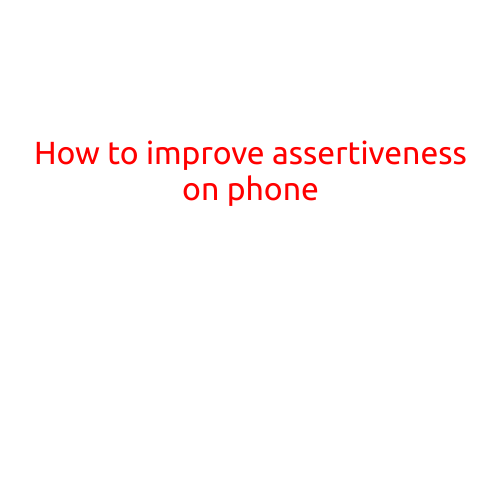
How to Improve Assertiveness on Phone
Effective communication is crucial in both personal and professional relationships. With the rise of technology, phone conversations have become an essential part of our daily lives. However, many of us struggle to express ourselves assertively over the phone, leading to miscommunication, frustration, and even missed opportunities. In this article, we’ll explore how to improve your assertiveness on phone, helping you to communicate more effectively and build stronger relationships.
Understand the Importance of Assertiveness
Assertiveness is the ability to express your thoughts, feelings, and needs clearly and respectfully, while also considering the needs and feelings of others. In phone conversations, assertiveness is particularly important as it allows you to:
- Convey your message effectively
- Set boundaries and maintain personal space
- Build trust and credibility
- Avoid misunderstandings and conflicts
Tips to Improve Assertiveness on Phone
- Prepare Ahead: Before making or receiving a phone call, take a moment to collect your thoughts and articulate your message. This will help you stay focused and ensure you communicate clearly.
- Use a Calm and Confident Tone: A calm and confident tone can go a long way in asserting yourself on the phone. Practice deep breathing and speak at a moderate pace to convey confidence.
- Listen Actively: Active listening is a crucial aspect of assertive communication. Pay attention to the person speaking, ask questions, and paraphrase to ensure you understand their perspective.
- Be Clear and Concise: Avoid using jargon or overly complex language. Instead, use simple and straightforward language to convey your message.
- Set Boundaries: Don’t be afraid to set boundaries and establish clear expectations. For example, if someone is asking you to do something outside of your scope, politely decline and reiterate your responsibilities.
- Use “I” Statements: Instead of making accusatory statements, use “I” statements to express your feelings and needs. This helps to avoid blame and defensiveness.
- Maintain Eye Contact: Even when you’re speaking over the phone, maintain eye contact by looking at the person’s photo or a focal point. This helps to maintain a sense of connection and encourages more effective communication.
- Don’t Apologize Unnecessarily: Avoid apologizing excessively, especially when you’re not at fault. Instead, focus on finding a solution or resolving the issue.
- Practice makes Perfect: Like any skill, assertiveness takes practice. Use role-playing and real-life situations to hone your skills and build confidence in your abilities.
- Seek Feedback: Ask for feedback from others on your phone communication style. This can help you identify areas for improvement and develop more effective communication strategies.
Common Mistakes to Avoid
While improving assertiveness on phone, be mindful of common mistakes to avoid:
- Interrupting or dominating the conversation
- Being overly aggressive or confrontational
- Being passive or submissive
- Avoiding direct communication or using indirect language
- Being insincere or condescending
Conclusion
Improving assertiveness on phone requires practice, patience, and self-awareness. By following the tips and avoiding common mistakes outlined in this article, you’ll be well on your way to communicating more effectively over the phone. Remember that assertiveness is not about being aggressive or confrontational, but rather about expressing yourself clearly and respectfully while also considering the needs and feelings of others. With time and practice, you’ll become more confident and comfortable with assertive communication, leading to stronger relationships and more successful outcomes.





